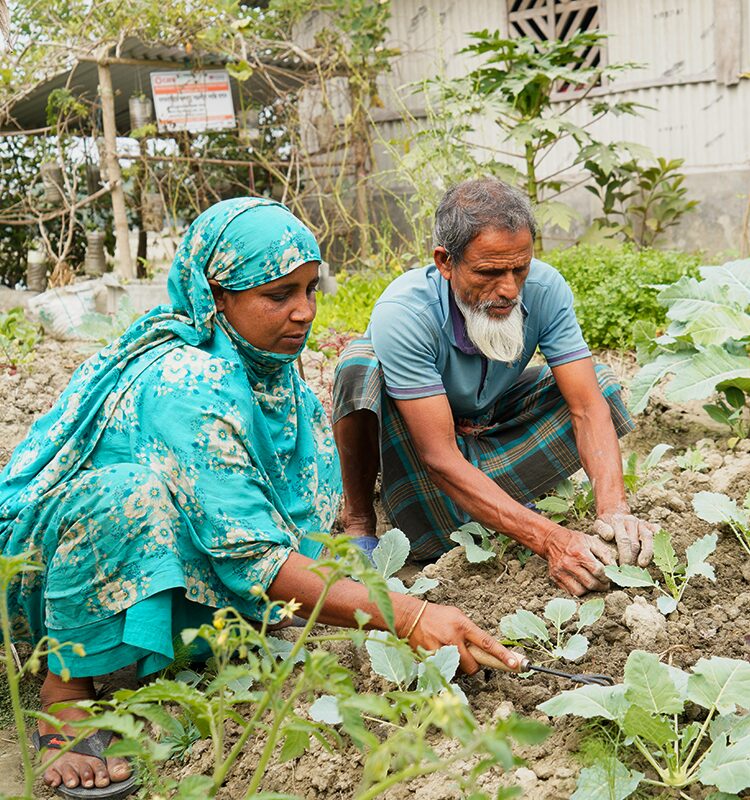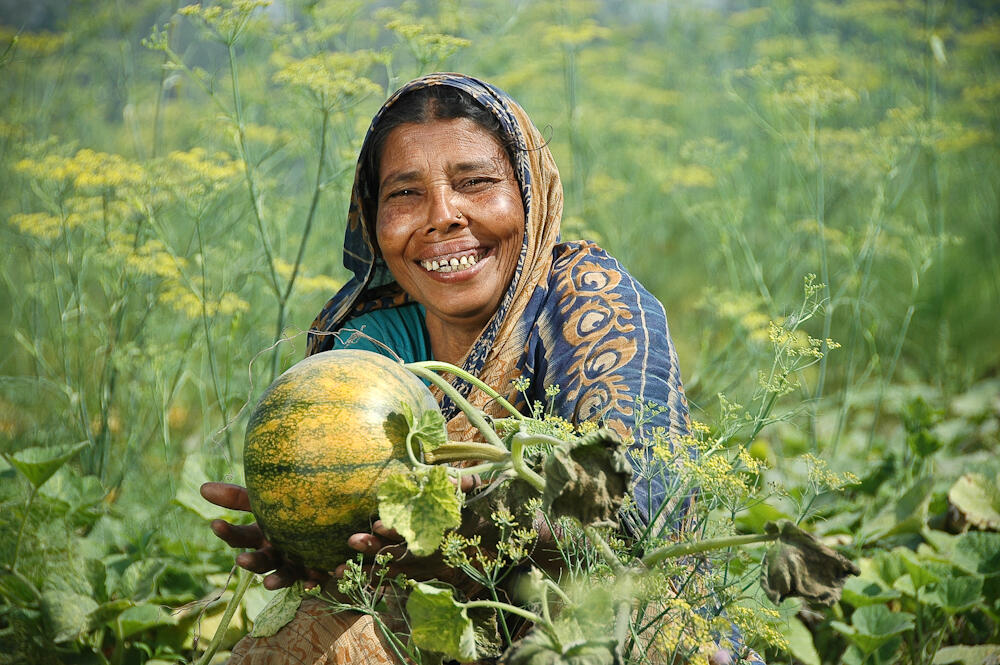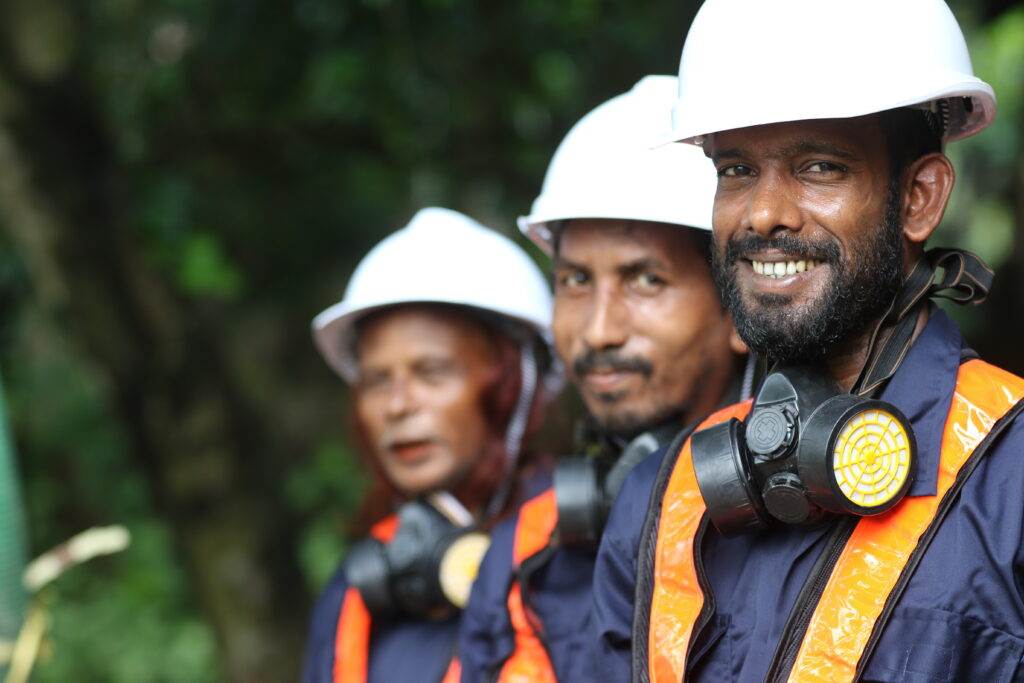
NABAPALLAB
Nature-based Solutions for Sustainable Agriculture
In Bangladesh, agriculture plays a vital role in the livelihoods of nearly half the population. But climate change is putting that at risk. Rising salinity, water shortages, and declining soil health are affecting vulnerable areas the most, threatening their biodiversity and the natural resources that communities depend on. Women, who make up 58% of the farming workforce, are especially at risk.
NABAPALLAB stands for Nature-Based Adaptation towards Prosperous and Adept Lives & Livelihoods in Bangladesh. The word ‘Nabapallab’ also means ‘new leaf’ in Bangla, symbolising new beginnings, growth, and strength. Through this project, we’ll support rural communities in the Sundarbans mangrove and Hakaluki Haor wetlands in adapting to nature-based solutions in farming, fishing, and livestock rearing. The project is led by CARE Bangladesh, implemented by Practical Action in Sundarbans, and supported by the UK’s Foreign, Commonwealth and Development Office (FCDO).
Nature and livelihoods under pressure
The Sundarbans and Hakaluki Haor are two of Bangladesh’s most important natural regions. Rich in biodiversity, they help regulate the climate and support thousands of families who rely on farming and fishing for their livelihoods. The Sundarbans, the world’s largest mangrove forest and a UNESCO World Heritage Site, acts as a natural shield against cyclones and tidal floods. Hakaluki Haor, one of the largest wetlands in the world, is home to diverse wildlife and plays a vital role in seasonal food production.
But both ecosystems are under growing pressure. In the Sundarbans, rising salinity, deforestation and unsustainable farming are threatening the environment and the communities that depend on it. In Hakaluki Haor, seasonal flooding, waterlogging and biodiversity loss are making it harder to grow food and earn a living. Across both areas, limited access to clean water, healthy soil and essential farming tools makes it even more difficult to adapt, especially for smallholder farmers, women and indigenous groups already facing the impacts of climate change.
These challenges are environmental, but also social and economic. In response, CARE, Practical Action and partners are supporting nature-based solutions that help people and ecosystems thrive together. By encouraging more sustainable ways to farm, fish and raise livestock, we are helping communities protect the resources they depend on and build resilience for the future.

Project Overview
Full title: Nature-Based Adaptation towards Prosperous and Adept Lives & Livelihoods in Bangladesh (NABAPALLAB / নবপল্লব)
Dates: October 2023 to December 2026 (phase 1), extended to September 2028 (phase 2).
Location: Khulna, Sundarbans and Hakaluki Haor, Bangladesh. Practical Action will lead activities in the Sundarbans region.
Our role: Introducing climate-smart farming methods through the SuPER approach (Sustainable, Productive, Equitable and Resilient agriculture), alongside nature-based fish farming, improved livestock systems and renewable energy solutions. We also deliver climate information services and work with partners to shape sustainable fisheries strategies.
Participants: 63,876 households from Dacope, Koyra, and Paikgachha Upazilas (sub-districts) of Khulna District.
Project budget: Phase 1: £2,179,914 GBP, Phase 2: £3,375,023 GBP
Themes: Agriculture, Farming and Energy
Lead donors: FCDO – the UK Foreign, Commonwealth and Development Office and CARE (lead of the consortium)
Our approach
With support from the FCDO and in association with CARE, our work on the NABAPALLAB project is transforming the lives of 63,876 households in coastal Sundarbans areas, including Dacope, Koyra, and Paikgachha. We focus on regenerative, nature-based solutions that reflect local needs and realities, especially for women whose lives and incomes depend on natural resources.
We are supporting these communities to:
- Grow crops that can handle water scarcity and increased salinity
- Restore soil health to keep farmland productive
- Farm fish in ways that protect wetlands and water quality
- Adapt livestock farming to changing climate conditions
From nature-based innovation to resilience
To make this possible, we are:
- Scaling up farming approaches that work in water-scarce, saline environments
- Restoring soil health through regenerative techniques
- Expanding fish and livestock systems that support nature and nutrition
- Using renewable energy—like biogas and solar—for cleaner, low-emission production
- Strengthening early warning and advisory systems to keep communities safer in coastal disaster zones
- Promoting market access and fair pricing to improve incomes and reduce reliance on wild aquatic species
- Working with local governments, ministries and technical partners to connect environmental restoration with economic opportunity and social equity
Together, these efforts support food security, income growth, and long-term climate resilience for vulnerable coastal communities.
Our goals
By the end of the project, we aim to:
- Contribute to the protection and restoration of 5,000 sq. km of Ecologically Critical Areas in the Sundarbans and Hakaluki Haor.
- Engage 13,250 households in locally-led adaptation planning.
- Provide 30,478 households with access to renewable energy.
- Support 110,086 households with nature-positive, climate-resilient livelihoods.
- Improve access to climate-resilient housing, community infrastructure and knowledge for 52,190 households.
- Deliver climate-resilient WASH services to 45,186 households.
Project funded by:
Work like this depends on your support
Help us work with communities to tackle some of the world’s toughest problems.





